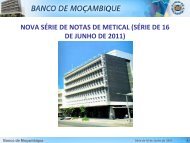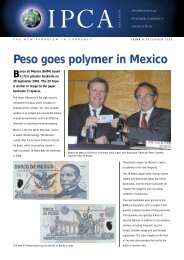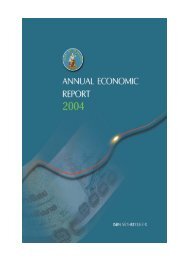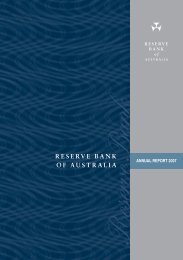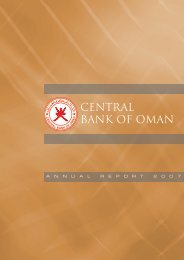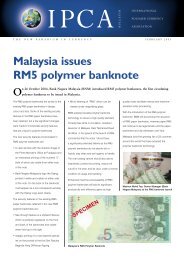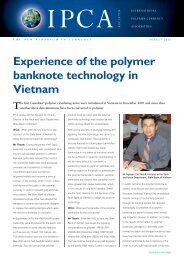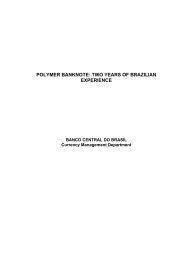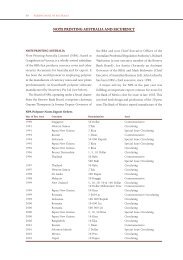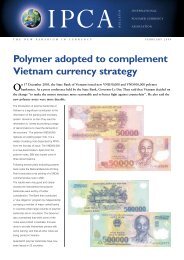ANNUAL REPORT 2008 - Polymer Bank Notes of the World
ANNUAL REPORT 2008 - Polymer Bank Notes of the World
ANNUAL REPORT 2008 - Polymer Bank Notes of the World
Create successful ePaper yourself
Turn your PDF publications into a flip-book with our unique Google optimized e-Paper software.
2 ORGANISATIONAL DEVELOPMENTS2.1 HUMAN RESOURCESIn <strong>2008</strong> <strong>the</strong> ECB continued to implement itshuman resources (HR) policy framework, whichincorporates <strong>the</strong> ECB’s values and <strong>the</strong> basic HRprinciples. 18 The HR policy framework explainswhy specific HR policies have been chosen andhow <strong>the</strong>y relate to one ano<strong>the</strong>r. Under <strong>the</strong>framework, policies relating to HR managementfall into four main areas:CORPORATE CULTUREWith staff from <strong>the</strong> 27 EU Member States, <strong>the</strong>ECB has integrated diversity management intoits HR practices to ensure that <strong>the</strong> individualcompetencies <strong>of</strong> staff are recognised and fullyutilised for <strong>the</strong> purpose <strong>of</strong> achieving <strong>the</strong> ECB’sobjectives. The management <strong>of</strong> diversity at <strong>the</strong>ECB is based on <strong>the</strong> diversity strategy launchedin 2006. It seeks to ensure that all members<strong>of</strong> staff are treated with respect and that <strong>the</strong>irperformance is assessed on <strong>the</strong> basis <strong>of</strong> merit.In <strong>2008</strong> <strong>the</strong> ECB organised its first diversityforum for managers with <strong>the</strong> aim <strong>of</strong> increasingawareness <strong>of</strong> diversity issues and sharing viewsand experiences on various topics linked togender, nationality and age.The six ECB common values (competence,effectiveness and efficiency, integrity, teamspirit, transparency and accountability, andworking for Europe) were fur<strong>the</strong>r embedded in<strong>the</strong> HR policies with a view to shaping day-todaybehaviour and improving performance.STAFF DEVELOPMENTThe general principles for internal mobility at<strong>the</strong> ECB, which encourage members <strong>of</strong> staffto change positions after five years <strong>of</strong> service,continued to receive considerable support.Mobility is seen as an opportunity for staffto widen <strong>the</strong>ir expertise and develop <strong>the</strong>irskills and as a means for <strong>the</strong> ECB to broadenawareness among its staff and increase synergiesacross business areas. The internal recruitmentpolicy, which places emphasis on broadcompetencies, thus aims to fur<strong>the</strong>r facilitateinternal staff mobility. In <strong>2008</strong> 165 members<strong>of</strong> staff, including 17 managers and advisers,moved internally to o<strong>the</strong>r positions, ei<strong>the</strong>r on atemporary or on a long-term basis.The ECB’s external work experience schemefacilitates <strong>the</strong> secondment <strong>of</strong> staff to <strong>the</strong> 27NCBs in <strong>the</strong> EU or to relevant internationalorganisations (e.g. <strong>the</strong> IMF and <strong>the</strong> BIS) forperiods <strong>of</strong> two to twelve months. 23 members<strong>of</strong> staff were seconded under this scheme in<strong>2008</strong>. In addition, <strong>the</strong> ECB granted unpaidleave, for up to three years, to 30 members <strong>of</strong>staff. Many <strong>of</strong> <strong>the</strong>m (19) took up employmentat NCBs, international organisations or privatecompanies. O<strong>the</strong>rs used <strong>the</strong>se periods <strong>of</strong> unpaidleave for study purposes. The total number <strong>of</strong>staff members on unpaid leave at <strong>the</strong> end <strong>of</strong>December <strong>2008</strong> was 54 (compared with 56 in2007), while <strong>the</strong> number <strong>of</strong> staff on parentalleave was 26 (compared with 23 in 2007).In addition to promoting mobility, includingmanagerial rotation, <strong>the</strong> HR strategy continuedto focus on <strong>the</strong> development <strong>of</strong> ECB staff and,in particular, on streng<strong>the</strong>ning managerialskills through training and individual coaching.Training for managers concentrated on <strong>the</strong>enhancement <strong>of</strong> team performance, leadershipand recruitment skills, and various aspects <strong>of</strong>performance management.Managers also participated in <strong>the</strong> multi-sourcefeedback exercise in which directly reportingstaff, peers and external contacts identify areasfor managers’ personal development. Basedon <strong>the</strong> results <strong>of</strong> <strong>the</strong> multi-source feedback,individual coaching was provided.The continuous acquisition and development <strong>of</strong>skills and competencies by all members <strong>of</strong> staffremains a cornerstone <strong>of</strong> <strong>the</strong> ECB’s HR strategy.As a basic principle, learning and developmentare a shared responsibility between staff andinstitution. On <strong>the</strong> one hand, <strong>the</strong> ECB provides<strong>the</strong> budgetary means and training frameworkand managers define <strong>the</strong> training needs <strong>of</strong> staff18 The basic HR principles are: organisational need, decentralisedstaff management, merit, diversity, attractive employmentconditions and reciprocal commitment.ECBAnnual Report<strong>2008</strong>207



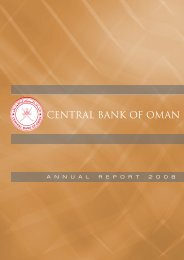
![KNOW YOUR NEW GIBRALTAR BANKNOTES - [Home] bThe/b](https://img.yumpu.com/50890985/1/184x260/know-your-new-gibraltar-banknotes-home-bthe-b.jpg?quality=85)
![PAPUA NEW GUINEA - [Home] - Polymer Bank Notes of the World](https://img.yumpu.com/49758743/1/190x143/papua-new-guinea-home-polymer-bank-notes-of-the-world.jpg?quality=85)

